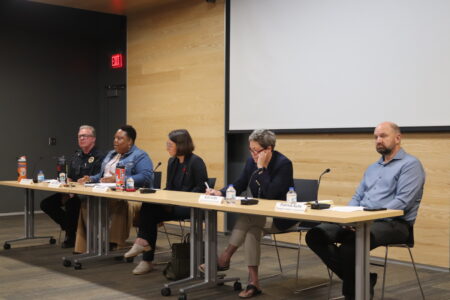County’s cash balances grew by $14 million in 2024, annual audit shows
Commission to receive annual financial statements at Wednesday meeting

photo by: Journal-World
The west side of the Douglas County Courthouse, 1100 Massachusetts St.
Douglas County’s cash reserves grew by $14 million in 2024, according to financial statements county commissioners will consider approving on Wednesday.
According to the county’s audit report from Allen, Gibbs & Houlik, L.C., the county began the 2024 fiscal year with an unencumbered cash balance of $131,988,631 and ended the year with $145,867,339. The money is the amount of cash on hand that is not committed to be spent on a specific project.
The report also noted that the county’s fund for its day-to-day operations – the general fund – grew to $22,024,255 over fiscal year 2024 from when it started the fiscal year at $21,845,540. The county’s capital improvement plan fund increased by $7.8 million to nearly $42.75 million; the mental health sales tax fund increased by $4.7 million and finished the year with $20.77 million; and the local county sales tax fund increased by $3.6 million, ending the year at $20.61 million.
There are several funds in the 2024 financial statements that violate the county’s fund balance policy, which says budgeted accounts shall not have fund balances greater than 25% of the account’s total revenue. For example, the employee benefits fund exceeds the policy limit by nearly $4.2 million, while the road and bridge fund has $752,291 more than what the policy allows. There are some funds in compliance with the policy, like the general fund.
As the Journal-Workd reported, county commissioners approved year-end transfers in February that violated the policy. Those transfers are reflected in the year-end financial statements.
Commissioners and County Administrator Sarah Plinsky have said they plan to review the fund balance policy for possible changes, but the issue hasn’t yet come up for debate by the commission.
Such fund balances normally are used as a type of rainy day savings accounts to address unexpected expenses or revenue shortfalls. Some accounts, like capital improvement accounts stockpile funds to be used for future building projects, for example.
The financial statements showed that for every dollar the county spent in 2024, it had 85 cents sitting in reserve. The financial statements listed $171.4 million in expenses and $145.8 million in unencumbered cash reserves.
The auditors that conducted the 2024 financial statement of Douglas County reported no major issues or unusual transactions.
A few audit adjustments were recommended by the auditors, and these included an adjustment to accounts payable in the employee benefits trust and workers’ compensation funds for estimated claims incurred but not yet paid, resulting in a decrease to fund balance of $225,309. Another adjustment was made to accounts payable to record a liability owed at year-end, decreasing the fund balance by $2,058,339. Lastly, beginning unencumbered cash balances were corrected to align with the prior year’s report.
The auditors did highlight some areas for ongoing improvement, such as enhancing controls over electronic fund transfers, strengthening cybersecurity oversight, and conducting a comprehensive review of financial policies and procedures.
In other business, county commissioners will:
• Consider approving changes to the county’s property tax rebate program for 2026, as recommended by staff. In October 2024, the County Commission voted to implement the pilot program and provide targeted property tax relief to low-income seniors and disabled veterans in Douglas County. The program was initially funded with $500,000 from funds within the county’s operating budget and applications were processed by the County Clerk’s Office and the County Administration.
There were 135 applications received and 109 of those applications were eligible for a rebate. The maximum a resident could receive in a rebate was $$300, and the average rebate was $281. A total of $30,905 was rebated to taxpayers. This equated to a 37% rebate on the County’s portion of property tax and a 13% rebate of the total property tax homeowners paid.
Since this was the first year of the program, staff are recommending adjustments. One of the changes includes changing the maximum rebate to $400 per household, meaning there would be enough funding for at least 1,172 rebates if the maximum is increased from $300 to $400.
• Consider authorizing the Public Works director to solicit bids for a mill and overlay project to add depth to existing pavement where it’s needed on Route 5, from Route 1039 to Route 442 – which will cover 10.5 miles.
• Consider approving a resolution establishing a 35-mph speed limit on E1900 Road – from N100 Road to N200 Road – in Palmyra Township. A memo in the agenda said the current speed limit is 45-mph and residents have raised concerns about high traffic volume, dust and vehicle speeds.
The County Commission’s business meeting will begin at 5:30 p.m. Wednesday in the Douglas County Commission meeting room at 1100 Massachusetts St. The meeting will also be available via Zoom.






